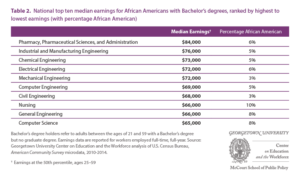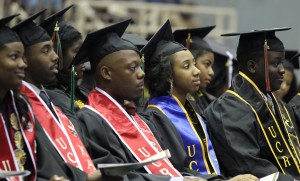Black students are falling short and falling behind, particularly when it comes to lifetime earnings and the careers they choose, according to a new study. And their high level of education is not reflected in how much money they make. Although a college education increases one’s chances of getting ahead, African-Americans are over represented in majors that land them in lower-paying occupations, as was reported in the Wall Street Journal.
The report, compiled by Georgetown University’s Center on Education and the Workforce, took an assessment of Black people’s share of bachelor’s degrees in 137 college majors. Although African-Americans are 12 percent of the U.S. population, they are only 8 percent or less of the highest-earning majors, and 17 percent or higher of the lowest-paying majors. In other words, there are many Black folks represented in “intellectual and caring professions” such as social work, human services and community-related work, but not so many in science, engineering and technology.

“If you’re an African-American who majors in math, you’re more likely to become a school teacher. If you’re a white male who majors in math, you’re more likely to go on to grad school in business, or to seek out higher education opportunities,” he said.
The author suggests not to remove or redirect people from crucial jobs in society, but rather to provide students with counseling to best match them with careers based on their values, personalities and interests, with guidance on how to get where they are going.
The findings coming out of Georgetown sound very familiar to the teachings of Dr. John Henrik Clarke. Dr. Clarke spoke eloquently about the need for the Black community to have a direct, collective involvement in determining the educational needs of its young people, in order to ensure the success of the individual and the group. He used Japan as a prime example of how to achieve liberation through the educational process:
Why are the students studying nonsense? Studying management and don’t even know what to manage. Why can’t we follow the example of the Japanese? They didn’t ask their students what they wanted to study. They lined them up and said: ‘Geography for you, medicine for you, oceanography for you, airplane design for you, automotive design for you, locomotive design for you, and you’d better get it.’
And they got it too, and made Japan a modern nation. They lost a war, suffered two atomic bombs. The same people who defeated them are now begging them for commercial space in the world. Not one demonstration, not one leaflet. Nobody shouted ‘yellow power.’ You shouted ‘Black power” and you had no power, Black or otherwise. You didn’t know what power was, still don’t know. Power can be had through cooperation, if you can stop the silly argument among yourselves and cooperate. Somebody’s going to have to call the tune. You got to sit down, who is best to call the tune?
…That’s what the argument at the threshold of liberation is about: How do we go?
Meanwhile, as the Houston Chronicle reported in 2008, 37 percent of Nigerians in the U.S. had bachelor’s degrees, 17 percent had master’s degrees and 4 percent held a doctorate, according to U.S. Census figures. By comparison, 19 percent of whites had bachelor’s degrees, 8 percent had master’s degrees and 1 percent had doctorates, while 12 percent of Asians had master’s degrees and 1 percent had doctorates.
The Chronicle notes that Nigerian immigrants enjoy the highest levels of educational attainment, due to high family expectations, Nigerian society’s emphasis on mandatory, free education, and the need to overcome being a double minority — Black and African. Further, U.S. immigration laws encourage skilled workers who are pursuing education.
In their book The Triple Package, noted “Tiger Mom” Amy Chua and husband Jed Rubenfeld say that Nigerians are one of eight social groups with a “cultural edge” in succeeding in the U.S., along with Cubans, East Asians, Indians, Jews, Lebanese, Mormons and Persians. While the book has stirred up a bit of controversy and disagreement — amid charges of flawed reasoning and that they play into racial stereotypes and claims of cultural superiority — the authors say Nigerians and others excel because of 1) a feeling of self-worth and superiority; 2) a feeling of insecurity and uncertainty and a need to prove oneself; and 3) being able to endure austerity and sacrifice short-term pleasure for long-term gain.
In a society where we were not intended to learn to read or write, where Black unemployment stands almost permanently at double the white rate, and uneducated whites earn more than Blacks with a degree, it is time to seize the reins of our children’s education, and by extension, the empowerment and ultimate liberation of our community.


